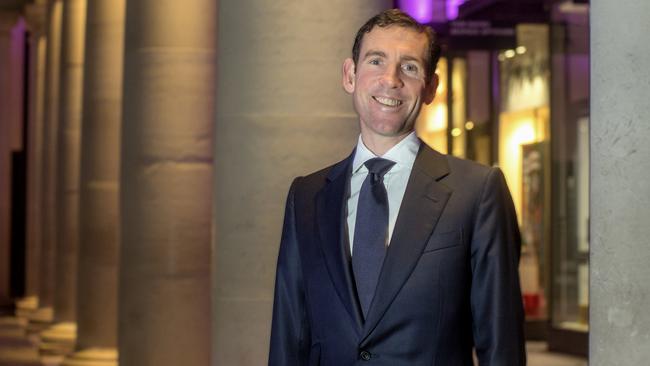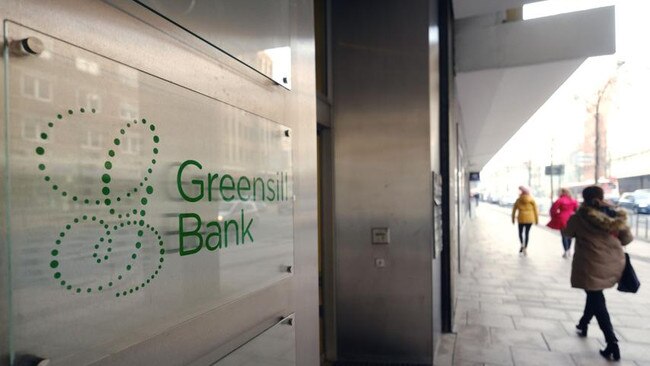Greensill raising in ASIC’s sights
Corporate regulators are circling Greensill after revelations the company sought restructuring advice within weeks of spruiking a $US600m raising ahead of a much-hyped IPO.

The Australian corporate regulator is circling collapsed global financier Greensill Capital following revelations the company sought restructuring advice — canvassing a potential insolvency — within weeks of spruiking a $US600m ($771m) capital raising ahead of a much-hyped IPO.
Grant Thornton, appointed Greensill’s administrator this week, was initially called in to provide restructuring advice in late December. It was not involved in the $US600m capital raising, which was quickly abandoned.
Credit Suisse, Citibank and law firm Allen & Overy advised Greensill on the raising, a teaser for a potential listing on the ASX which would have valued Greensill at $US7bn.
Questions are now swirling over whether the capital raising was a rescue package rather than a fund injection to pay for the next stage of Greensill’s growth.
An ASIC spokesman said the regulator was monitoring Greensill while Grant Thornton fully assessed the situation. Grant Thornton’s British and Australian arms are running two separate administrations over Greensill’s insolvent local and UK operations, with its first creditors meeting scheduled for next Friday.
“ASIC does not become directly involved while the external administrators Grant Thornton are carrying out their role, though obviously we are watching closely as it develops and the process continues,” an ASIC spokesman told The Weekend Australian.
Warning signs emerged at Greensill last September when it began negotiations with its trade credit insurance provider Bond & Credit Co (BCC) after it indicated it would not renew its policies.
Greensill relied heavily on insurance in its business model, lending money to companies to pay their suppliers, with insurance in place to protect it against defaults, and the company warned of “disastrous consequences” should the policies expire.
Despite doubts about its insurance coverage, Greensill steamed ahead with investor meetings about the pre-IPO raising, with the company’s founder Lex Greensill telling The Australian in mid-December that the company was in good shape.
“I love a challenge and this year has certainly presented some fun ones to test us out. But the thing that has been exciting within the organisation has been how the dynamic of our team has stretched to deliver, in unprecedented circumstances,” Mr Greensill said at the time.
But behind the scenes, the company’s pipeline of new customers was slowing, given the controversial nature of supply chain financing, which generally involves a company’s suppliers paying a fee for earlier payment of invoices.
Several companies had used the platform to blow out payment times beyond the standard 30 days, which Greensill said it was determined to stamp out following a series of damning revelations in The Australian.
The stain around supply chain financing proved difficult to remove, with Greensill becoming more reliant on Sanjeev Gupta’s GFG Alliance, which owns the Whyalla steelworks and owes Greensill at least $US5bn.
Grant Thornton’s British arm was called in to provide contingency planning advice in late December, considering all options from restructuring to declaring insolvency — as per standard practice — with the later emerging as the only option on March 1 when insurance policies expired. Despite applying for a court injunction, Greensill plunged into voluntary administration a week later.
Mr Gupta’s group has been negotiating a standstill directly with Greensill management, but any agreement — which is believed to be imminent — must be signed off by Grant Thornton UK.
And the industrialist was dealt a fresh blow on Thursday night when ratings agency Moody’s downgraded Mr Gupta’s most profitable asset InfraBuild from Ba3 to B1. The move reflected the increasing risk of “contagion” from the troubles besetting GFG due to its relationship with Greensill.

Despite the fallout, prominent economist Ross Garnaut said this week he remained a member of GFG’s international advisory board and hoped all parts of the business would continue operating.
“Obviously we are all hopeful. It’s good for Australia if it pulls through,” Mr Garnaut told The Weekend Australian.
Mr Gupta demerged the retail arm of Ross Garnaut’s Zen Energy from its industrial empire in August 2020 after buying a majority stake in Zen nearly three years ago as part of a merger deal.
GFG took full ownership of the renewable power, battery storage and project development side of the business under the Simec Energy Australia banner.
It was originally targeting development of up to 3000 megawatts of renewables in addition to the planned 280MW Cultana solar farm in South Australia, with the entire capacity forecast to be used for a new green hydrogen steel plant at Whyalla.
Greensill’s Australian parent is sweating on GFG’s ability to repay its debt. Grant Thornton Australia is acting for Greensill’s Australian arm, which is a holding company with about 40 employees, and also a creditor of Greensill Capital UK.
It is seeking a “sizeable claim”, potentially totalling hundreds of millions of dollars in loans to the British operation.
Credit Suisse, meanwhile, has moved to distance itself from Greensill, winding down its supply chain finance investment funds, which total billions of dollars, after Greensill’s insurance policies expired.
The Swiss bank has terminated four funds and said that liquidation proceeds would be paid out to investors “in several instalments”, with the first payment set to be about 80 per cent of available cash.
“The valuation uncertainty with respect to certain investments, the reduced availability of insurance coverage for new investments and the substantial challenges to source suitable investments make it currently unachievable for the Credit Suisse supply chain funds to remain invested in accordance with their investment policies,” Credit Suisse said.
“Credit Suisse Asset Management fund boards consider that these market conditions will endure such that the funds can no longer be appropriately managed and have therefore decided to terminate the funds with effect as of March 4, 2021.
“All shares of the funds will be compulsorily redeemed and will participate pro-rata to the funds’ assets. Pending redemption requests will be cancelled.”
Credit Suisse also said it would waive all management fees with “immediate effect”.
In its prospectus, issued last November, Credit Suisse said its Nova (Lux) Supply Chain Finance Investment Grade Fund aimed to “provide stable and uncorrelated returns through investments in zero coupon global notes issued at discount by a special purpose vehicle with a maturity of typically less than three years.
“The notes are backed by buyer-confirmed trade receivables/buyer payment undertakings, supplier payment undertakings and account receivables.”
It also said it would acquire notes with a minimum credit rating of BB- by Standard & Poor or Ba3 by Moody’s.
But Credit Suisse added that at the minimum credit ratings, “the underlying credit risk is ensured by an insurance company which is at least rated A- by Standard and Poor’s or A3 by Moody’s”.
It said that “in case an insured event occurs, the sub-fund will benefit from its status as a loss payee under the relevant insurance contract”.







To join the conversation, please log in. Don't have an account? Register
Join the conversation, you are commenting as Logout